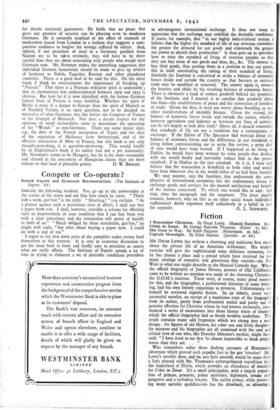Fiction
1 Remember Christine. By Oscar Lewis. (Hamish Hamilton. 8s.1 Crisis in Zanat. By George Malcolm Thomson. (Faber. 7s. 6d.) She Goes to War. By Edith Pargeter. (Heinemann. 95. 6d.) Captain Moonlight. By Ethel Mannin. (Jarrolds. 9s. 6d.) MR. OSCAR LEWIS has written a charming and malicious first novel about the private life of an American millionaire. His wicked exercise will give the sophisticated some delicious moments, for he has chosen a place and a period which have received far too many coatings of romantic and glamorous film varnish—the Far West in what one might describe as the Musical Comedy Age. When the official biography of James Horton, pioneer of Old Califbrnia, came to be written no mention was made of the charming Christine, the G.O.M.'s mistress. There were, of course, many good reasons for this, and the biographer, a professional historian of some stand- ing, had his own literary reputation to preserve. Unfortunately for himself he reviewed regional fiction. So an elderly, never very successful novelist, on receipt of a handsome copy of the biography from its author, partly from professional malice and partly out of genuine affection for Christine whom he had known intimately, com- menced a series of excavations into those thorny tracts of country which the official biographer had so firmly trodden underfoot. The result contains many odd fragments which are strung into a nea: design: the figures of old Horton, his sober son and lively daughter, his mistress and his biographer are all examined with the cool and critical eyes of one who, like Dorothy Osbomes mother, might ha' said: "I have lived to see that 'tis almost impossible to think people worse than they are. . . ."
Who remembers today those dashing accounts of Hentzauian adventure which proved such popular fare in the gay 'nineties? Mr.
Lewis's novelist does, and he, one feels assured, would be more than
a little pleased with Mr. Thomson's anthropological expedition ifil3 the hinterland of Illyria, which provides an abundance of material for Crisis in Zanat. It's a small principality, with a largish popula- tion of princes, peasants, prime ministers, diplomats, crooks and gangsters and a turbulent hiscory. The ruling prince, while posses-- ing many suitable qualificaiions has the drawback, or advantage,
whichever way you care to look at it, of having a pleasant but quite nondescript face, which even the most devoted of his loyal subjects cannot remember from one day to the next. He has also the honour to be the grandson of a saint, Prince Mikkel, founder of the present dynasty, who was a noted wisecracker in his time. Germany and Italy are both more than a little interested in this tiny State, they suspect it will be more than a little profitable to stir up trouble. This they do successfully, but the complications are many and unforeseen. Caught in thz storm are a variety of odd people, in- cluding an English journalist, some lively Americans and the beautiful Zoe, a luckless heroine who would have done so well for
herself in the New World. Mr. heroine, pace is fast, and at times uproarious, he can do a rough-and-tumble in a manner worthy of a script-writer for the Marx Brothers.
If authors are to be believed, going to war is not unlike going to school ; one is plunged into an unfamiliar pool of uncertain depths and left to sink or swim, according to one's own ability. Miss Pargeter is serving with the W.R.N.S., and her present novel is based on her own experience. Catherine Saxon, the heroine of She Goes to War, was a working journalist in the summer of 1940. Partly on account of Italy's behaviour and partly out of dissatis- faction with her handsome young man who gets himself into a reserved occupation at someone else's expense, she decides to join up. She is sent to Devonport, and after a few months is transferred to Liverpool, where she re-reeets a soldier casually encountered on a railway journey. They fall in love, discuss the war, spend a brief idyllic holiday in Wales together and separate. He is sent to Greece, withdrawn to Crete and does not return. A bundle of uncensored letters he wrote for Catherine are brought to her by an American reporter who escaped.
A novel in letters needs more than talent. Miss Pargeter is too heavily handicapped by her chosen method. Catherine's letters are addressed to a crippled relic of the last war, and they make up more than two-thirds of the book ; owing to certain insincerities of style they fail to convince us completely. This is a pity, because the author has something to say, which at times she does with passion and indignation. When ay.! allows her heart to run away with her head, something perilously near nonsense results The problems of life after the war must, and can, be met by the individuals who survive: the death, even of heroes, offers no solution to the living.
Captain Moonlight is a romantic period piece dealing with English village life in the first half of the last century. For hero and heroine we have the naughty children of a narrow-minded farmer and his narrow-minded wife. Jessica runs away with a gypsy, and dies as the result of a miscarriage. I esse goes poaching and charming fast
women, which he does once too often, for a female is found dead on the rocks and he is pursued by the law. A kind-hearted prostitute shelters him, and after several adventures he finds sanctuary on an Irish isle, where he marries and raises a large family. Miss Mannin has produced a set of brightly coloured waxwork figures to decorate



























 Previous page
Previous page